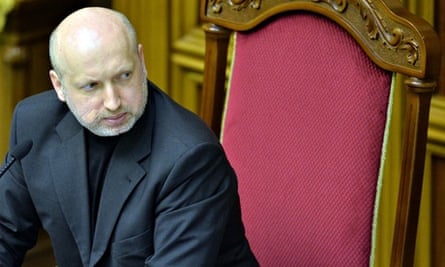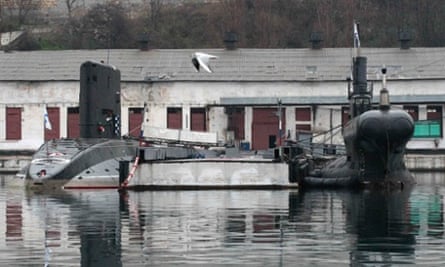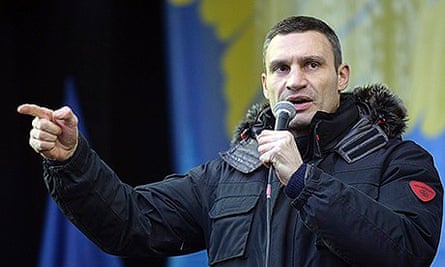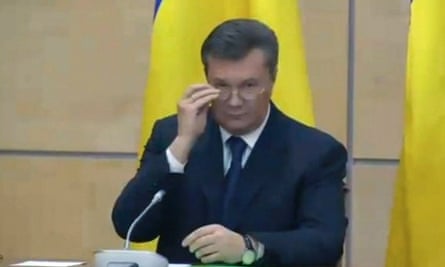Ukraine has put its armed forces on full alert and warned Russia that military intervention will lead to war shortly after Vladimir Putin gave the green light for an invasion as the upper house of the Russian parliament unanimously approved his request to send troops into the neighbouring state.
After a three-hour meeting with security and defence chiefs on Saturday, prime minister Arseny Yatseniuk said he had called for talks and urged Russia to return its soldiers to base in the Crimea region during a phone call with his counterpart Dmitry Medvedev. "Military intervention would be the beginning of war and the end of any relations between Ukraine and Russia," Yatseniuk said.
Ukraine's acting president, Oleksandr Turchynov, said he had put the armed forces on full readiness because of the threat of "potential aggression" as 15,000 Russian troops were said to have joined those who have effectively seized Crimea. Speaking live on TV, Turchynov said he had also ordered stepped-up security at nuclear power plants, airports and other strategic infrastructure.

Putin told the US president, Barack Obama, during a 90-minute call on Saturday night that Russia had the right to protect its interests and those of Russian speakers not only in Crimea but also in east Ukraine. Obama called on Russian forces to pull troops back to base in Crimea and not interfere elsewhere. He also warned Putin that Russia faced greater political and economic isolation. The White House said in a statement: "President Obama expressed his deep concern over Russia's clear violation of Ukrainian sovereignty and territorial integrity, which is a breach of international law."
The US defence secretary, Chuck Hagel, told his Russian counterpart on Saturday that Moscow's military intervention risked creating further instability and an escalation "that would threaten European and international security," the Pentagon said.
Nato secretary general Anders Fogh Rasmussen said he would hold a meeting on Sunday to discuss the crisis after Ukraine asked it, the US and EU "to look at all possible mechanisms for protecting its territorial integrity".

Tensions escalated into the night when two Russian anti-submarine warships appeared off Crimea's coast, violating an agreement on Moscow's lease of a naval base, a Ukrainian military source was quoted as saying. The two vessels, part of Russia's Baltic Fleet, had been sighted in a bay at Sevastopol, where Moscow's Black Sea Fleet has a base.
Obama's national security team met to discuss policy options, according to a senior administration official, while David Cameron said: "There can be no excuse for outside military intervention in Ukraine – a point I made to President Putin when we spoke [on Friday]. Everyone must think carefully about their actions and work to lower, not escalate, tensions. The world is watching."
Foreign secretary William Hague said he was "deeply concerned" at the Russian parliament's decision to use troops in Ukraine. He said: "This action is a potentially grave threat to the sovereignty, independence and territorial integrity of Ukraine."
After several days of Russian stealth, the move to deploy forces came suddenly and decisively. The Kremlin said Putin wanted troops in Ukraine "until the sociopolitical situation is normalised". Less than an hour later, in a hastily convened extraordinary sitting of Russia's Federation Council that was laced with cold war rhetoric, senators voted unanimously to support Putin's proposal, and proposed withdrawing Russia's ambassador to the US in protest at an "insult to the Russian people" from Obama.
Earlier in Kiev, Turchynov, who has been in power since president Viktor Yanukovych fled a week ago, convened a special session of the cabinet, and spoke by telephone with the US secretary of state, John Kerry.
Former world heavyweight boxing champion Vitali Klitschko, a leading candidate in presidential elections set for 25 May, had called for parliament to convene and order a full mobilisation of the army. The United Nations security council was due to hold an emergency session to discuss Ukraine on Saturday night. In London, William Hague said that Russia's ambassador to Britain had been summoned to the Foreign Office.

The Russian decree does not limit the use of troops to Crimea, specifying only that the Russian military could be deployed "on Ukrainian territory", and the big question is how far the Kremlin wants to go. So far, Putin's statement only talks about "protecting the interests of Russian citizens and compatriots", but there are fears that Moscow is planning a full-scale annexation of Crimea, with its majority ethnic Russian population. Putin's press secretary, Dmitry Peskov, said that no decision to implement the decree had yet been taken.
Ominously, there were also clashes in the major eastern Ukrainian cities of Kharkiv and Donetsk on Saturday, with the deputy mayor of Kharkiv saying that 97 people had been injured in violence between supporters of the new government in Kiev and pro-Russian demonstrators.
Putin's move comes after two days during which the Kremlin's motives were unclear. Armed men seized the Crimean parliament on Thursday and the peninsula's airports on Friday, but claimed to be members of locally organised "self-defence squads".
Ukraine had already accused Russia of a "military invasion and occupation" of Crimea. Michael McFaul, until last week the US ambassador to Russia, castigated the Kremlin: "Russian companies and banks with business in the west will suffer as a result of reckless Putin decision. Will they speak up?" he tweeted.
But the parliamentary session roundly dismissed western criticism in advance. Senator Nikolai Ryzhkov said Russia should be prepared for the west to "unleash their dogs on us". "They ruined Yugoslavia, Egypt, Libya, Iraq, all in the name of western democracy. It's not even double standards, it's political cynicism."
Late on Friday night, Obama told Russia there would be "costs" for intervention in Ukraine. A senator in the Federation Council said it "crossed a red line" and "insulted the Russian people". The parliamentary body said it would ask Putin for the Russian ambassador to the US to be withdrawn.
However, actual signs of violence have been limited. The Russian foreign ministry claimed on Saturday that armed men "from Kiev" had tried to seize the government building in the Crimean capital, Simferopol, but had been repulsed by self-defence units, who took casualties. On the ground, nobody could offer any evidence of such an attack.

Yanukovych, who gave a press conference in the southern Russian city of Rostov on Friday at which he claimed he was still the legitimate president, has called the new government Nazis. His role is now unclear, but the Federation Council said he had approved the use of Russian troops. He fled after signing a compromise agreement with opposition leaders, in the presence of three EU foreign ministers. Russia has blasted the EU for failing to keep the opposition to its side of the bargain.
Yanukovych's flight from Kiev was the culmination of three months of protest, ending with 82 people being killed in clashes with riot police. Ukraine's new government has disbanded the Berkut riot police involved in clashes with protesters, while Russia has announced it will give them Russian passports. The first of them collected passports at a Russian consulate in Crimea on Saturday.
In Crimea on Saturday, there were more pro-Russia rallies, and the region already appeared under the control of Russian troops and pro-Russian militias, who were patrolling the airports, parliaments and roads in and out of the region.
Comments (…)
Sign in or create your Guardian account to join the discussion